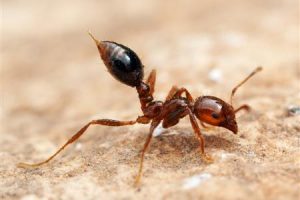How to Identify and Treat Fire Ant Bites
When you live in Florida, you need to take a few precautions regarding the world around you: watch out for “Florida man,” wear sunscreen, and know how to identify and treat fire ant bites. With Fire Ant Control, LLC, you can at least forget about the last one while on your own treated property.
Fire Ant Bite Information
 Fire ant “bite” is a bit of a misnomer. While fire ants do bite, they typically do this to hold on while they do the real damage with their stingers, with which they inject unique venom into their victim. They can sting repeatedly, and they typically attack as a group. It’s rare to experience a single fire ant bite.
Fire ant “bite” is a bit of a misnomer. While fire ants do bite, they typically do this to hold on while they do the real damage with their stingers, with which they inject unique venom into their victim. They can sting repeatedly, and they typically attack as a group. It’s rare to experience a single fire ant bite.
Fire ant venom creates a unique injury. It appears as a pimple filled with pus, and it itches and hurts for a period of time. While unusual, the venom causes a life-threatening anaphylactic reaction in a small percentage of the population.
Fire ants bite and sting when they feel threatened. Unfortunately, the slightest disturbance can trigger this over-reaction. Once a fire ant attaches and begins to sting, it will continue until they’re forced to stop.
Phases of a Fire Ant Bite Reaction
Phase One: an immediate burning and stinging feeling.
Phase Two: an itchy bump or welt forms within an hour.
Phrase Three: an itchy blister will replace the bump after a few hours.
Phase Four: the blister then fills with pus and heals after about a week. Avoid popping this blister; it can lead to infection and scarring.
For most people, this simple, but painful, reaction will be the extent of the fire ant bite’s symptoms. People with allergies may have more serious consequences:
- Local reaction – this reaction remains in a single region of the body near where the bite occurred.
- Systemic reaction – this reaction affects the whole body, causing symptoms like nausea, vomiting, diarrhea, and trouble breathing.
- Anaphylaxis – this reaction is severe and a threat to life with symptoms that include dizziness, blood pressure bottoming out, loss of consciousness, cardiac arrest, and death without fast medical intervention.
Fire Ant Bite Treatment
At Home:
- Remove the ants as quickly as possible.
- Wash the area with soap and water or an alcohol wipe.
- Take an oral allergy medication for the itch.
- Apply hydrocortisone cream to the area twice per day for the itch and rash.
- Apply a cold compress for itch, pain, and swelling.
For serious reactions the following treatments may be appropriate:
- Epi-Pen injection followed by trip to ER
- Prescribed oral corticosteroids
- IV antihistamines
- Oxygen
- CPR
- Other appropriate life-saving interventions in severe cases.
Fire Ant Bite Prevention
The clearest way to prevent fire ant attacks is to evict the fire ants from your property. For this result, contact Fire Ant Control, LLC. Within a life cycle, your property will be at least 85% free of fire ants, and with retreatment every four months, it will stay that way.
We apply a granular bait that appeals to the fire ants and then seals their fate when they carry it to the queen for her enjoyment. She becomes infertile, so as the living ants die, the colony has no new members of the population to replace them.
Learn more about how to identify and treat fire ant bites or how to mitigate their presence by clicking here or calling (239) 312-8200.
